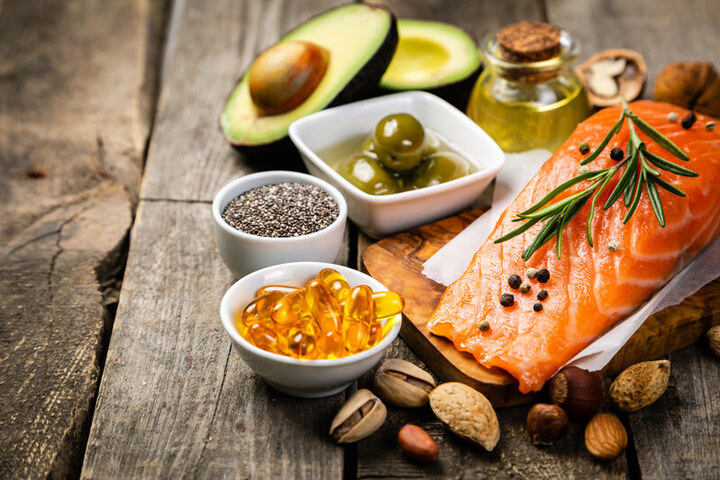These days, we’re overloaded with estrogen from every angle: conventional cosmetics, cleaning supplies, body care, water, food. High estrogen levels can have a negative impact on fertility, mood, energy, and even your period flow.
Just like our drug store makeup and conventional all-in-one spray, processed oils like canola and soy can also impact estrogen levels in the body. And here’s why: PUFAs.
What are PUFAs?
PUFAs stand for polyunsaturated fatty acids, and they behave like estrogen in the body. Like estrogen, PUFAs increase cellular proliferation (aka growth) by increasing the uptake of water and multiplying at a rapid rate. The accumulation of these PUFAs in the tissues stimulates an estrogenic response, creating excess synthetic estrogen levels. These fatty acids also suppress thyroid and metabolism function, which can affect energy, weight, mood, and stress levels.
Now you may be thinking, “well, aren’t polyunsaturated fats essential?”
The answer is yes, but only when you have a balance of polyunsaturated fats omega 3 and omega 6.
Most of us have too much omega 6 fatty acids in our diet. Omega 6’s are found in a lot of processed and packaged food and oils like potato chips. When our ratio of omega 6 to omega 3 fatty acids is off—say we’re consuming too many potato chips and fried foods and not enough healthy fish and seeds—we become pro-inflammatory. This is because fatty acids are incredibly fragile modules and oxidize when exposed to light, heat, and oxygen (aka cooking or the human body!)—but of course, at all different levels. For example, avocado oil has a much higher smoke point than, say, canola oil, which means it doesn’t go rancid or oxidize as quickly. When something oxidizes, it releases an onslaught of free radicals, which are the biggest culprits for chronic disease and aging.
When we consume too many foods high in the bad kind of PUFAs, our estrogen levels can hit the fan.
The key is a balance of omega 3 fatty acids (think small fish, flax seeds, chia seeds) and good omega 6 fatty acids (walnuts, pumpkin seeds, sunflower seeds).
When we are in balance, our estrogen levels can stay healthy, and we can avoid heavy periods, horrible PMS, fatigue, water retention, short cycles, breast tenderness, migraines, and more.
Because we live in a PUFA-laden society, it’s impossible to avoid them altogether—and you really don’t want to. Remember: it’s all about balance.
Tips to minimize bad PUFAs
- Avoid PUFA oils like canola, corn, soy, cottonseed, vegetable, safflower, peanut
- Reduce intake of processed foods
- You are what you eat eats: Avoid animal products fed soy and corn products which inherently increase PUFA content
- Prioritize organic, hormone-free and grass-fed meats (consume 2-3 times a week at most)
- Research fish oil or reconsider fish oil
- Should You Really Be Taking Fish Oil
- Omega 3 fat alternatives to fish oil: spirulina and barley grass, horsetail and nettle eave, wild blueberries, hemp seeds, sesame seeds, pumpkin seeds, walnuts, mangoes, sweet potatoes, raspberries, colorful melons, kale stems, artichokes, asparagus
- Opt for fats like tallow, coconut oil, ghee, avocado oil
Other Ways to Support Healthy Estrogen Levels
Estrogen is one of the many hormones that fluctuate during your cycle. Estrogen is responsible for keeping the vagina lubricated and signaling the healthy development of an egg to be released each month for fertilization. Here are ways we can keep estrogen levels in check:
Reduce stress
When we are too stressed, our bodies can withhold ovulation, which leads to too much estrogen and no progesterone. When we have too high levels of estrogen and not enough progesterone, we can miss our period and struggle with abnormal bleeding and even infertility.
Keeping stress at bay with non-negotiable life practices like meditation (whatever that looks like for you), exercise, dancing, hot baths, sauna, etc is necessary for balanced hormone levels.
Nutrient-Rich Diet
Magnesium and Vitamin B6, in particular, help to promote the breakdown and elimination of excess estrogen to maintain a proper balance.
Building gut health is also key. When our gut flora is out of balance, the bacteria that are supposed to break down estrogen don’t get to do their job. Including a diversity of foods will help nourish gut health.
- Reduce red meat consumption and meat with added hormones
- Include broccoli, cabbages, kale, cauliflower, brussel sprouts, leafy greens, and fruits in your diet
- Add in fermented foods like coconut yogurt, kimchi, and more to support gut health
Reduce exposure to endocrine-disrupting chemicals
Endocrine-disrupting chemicals are found in a lot of conventional products we use daily, including cosmetics, body care, cleaning supplies, plastics, food, and water.
Making sure you purchase organic products free of these chemicals (pesticides and herbicides when it comes to food!) can help support healthy estrogen levels.
Cut Down on Alcohol
Your liver maintains estrogen balance by breaking it down for elimination of the body. Alcohol, which wreaks havoc on liver strength, can lead to excess estrogen.





READ the Latest
Health Habits
Longevity
Health Habits
Health Habits
3 Comments